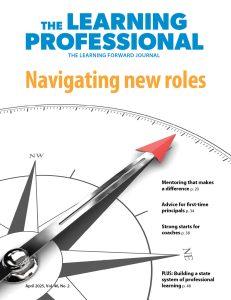Learning Forward Blog
Where did the Equity Standard go?
By Stephanie Hirsh |
Addressing equity is not something that can be separate from any other element of professional learning. It is integrated into any effective approach to any of Learning Forward’s standards.
Blogging: Learning beyond boundaries
By Dawn Wilson |
Dawn Wilson explains how blogging can elevate your professional practice and expand your virtual Professional Learning Network.
2 districts join Redesign PD Community of Practice
By Michelle Bowman |
Two school districts have joined the Redesign PD Community of Practice, bringing to 22 the number of school systems collaborating to improve professional learning systems and share their progress with districts across the country.
Turn Your Networking Into Powerful Professional Learning
By Stephanie Hirsh |
Executive Director Stephanie Hirsh shares the importance of networking and the ways to make these interactions most effective to you in your role.
Grant money supports creating an innovative, comprehensive learning system
By Heather Lageman |
The winner of the Learning Forward Foundation’s Learning System Grant, Hartford Public Schools, is focused on creating an innovative, comprehensive learning system that engages in a thoughtful cycle of continuous improvement.
What We Say And What We Mean
By Tracy Crow |
Director of Communications Tracy Crow explains how collaboration, communities, networks, and time for learning are only useful when learners employ them with purpose and are most likely to lead to change with sustained support and effort.
Leverage ESSA to improve professional learning in your district
By Stephanie Hirsh |
The Every Student Succeeds Act (ESSA) influences how districts plan and allocate resources, so here is Learning Forward’s view on the implications for professional learning.
4 ways to feed your conference learning needs
By Roderick Allen |
As a Superintendent / CEO of a school district, I am a classic omnivore. My professional learning needs to reflect that. In my role, I am expected to know at least something about everything and everything (or at least a lot) about some things.
Conference learning: Valuable for principals?
By Ashley Talley |
I normally walk away from the conclusion of conferences feeling one of two ways: 1. I’ve lost time in my building and gained little to nothing in return; or 2. I feel inspired, refreshed, and sometimes overwhelmed.
LEAP program at DC Public Schools assures coherence and relevance in teacher growth
By Nick Morgan |
Washington DC Public Schools has received a lot of national attention for its human capital policies, and the results have been impressive. Their LEAP program promises to continue the progress of the teacher growth.



